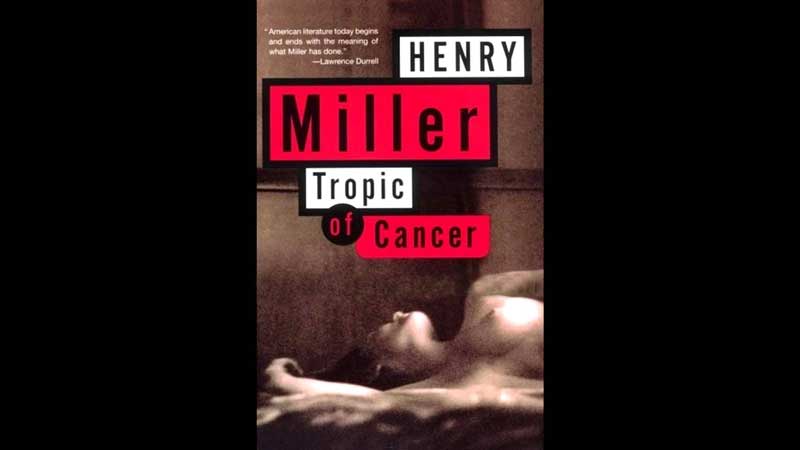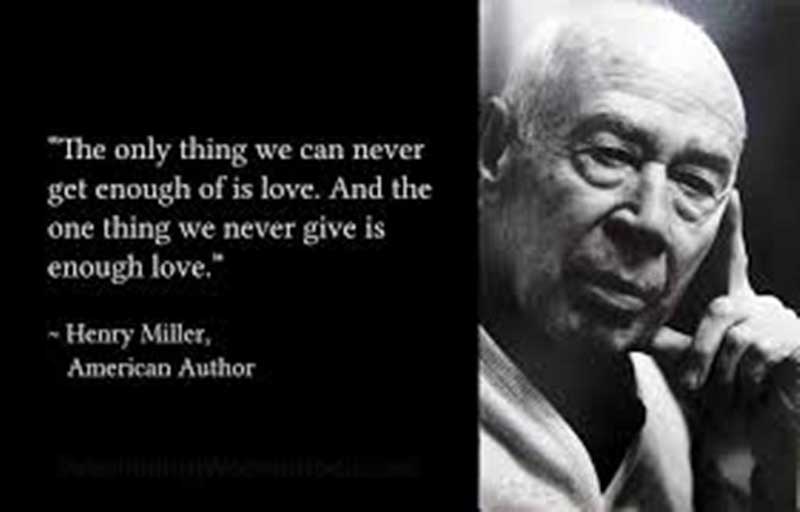
Henry Miller’s autobiographical novel ‘The Tropic of Cancer’ describes the life and experiences of an unnamed narrator, an American writer, who lives at the Villa Borghese with his friend, Boris, during the fall of his second year in Paris. He does not have money, nor any resources or hopes and yet, he thinks himself as the happiest man alive. He has written a book, which is actually, not a book. It is a defamation of character, a prolonged insult to art. The narrator promises to sing for his readers and the book will be that song. As the villa is to be rented, the narrator searches for another place to live in Paris and tries to survive without money. The story follows his search - search for work, bread and a place to sleep. His days are filled with the preoccupation of getting his next meal, his next lay and when he would finish his novel. He is also in search of love, emotional and sexual, as well. In fact, apart from a shelter, he is basically interested in writing and having sex with prostitutes, which are strange and weird, because he does not have any money, he is a broke. He had sex with all types of women, but most of his sex partners remain nameless and pretty much faceless.
The unnamed narrator prowls around Paris, intoxicated by its streets, cafés, and squares. Every day he returns to the American Express office on the Place du Opéra to see if he has any letter from home or money from Mona. He remembers his life back in the United States, and the cultural baggage of his past and the freedom he feels in the present merge in his mind and his art.

He introduces the reader to his numerous friends. He recalls Mona, who has a little place in his heart, because she is his wife, who never arrives from home. He clearly has a thing for Tania as well, to whom he is singing in the novel. He talks about Borowski, Van Norden, Boris, Moldorf and finally Irene, who, like Tania, demands fat letters from him. Henry also talks about the other prostitutes, with whom he had sex and provides the reader with some amusing anecdotes about his cunt-struck friends. He planned to get food by writing to various acquaintances and beg a meal with each of them once a week. He also writes to beg money from his various women. He scrutinizes his love life and the sexual exploits of his friends.
The homeless unnamed narrator finds a shelter, when he meets Serge, an enthusiastic Russian. Serge puts him up in his apartment outside of Paris and provides him a few crusts of bread in exchange for English lessons. But, the bed bugs and tapeworm soon became too much for him and he left the Russian at the first chance. Next, he met a rich Hindu Pearl merchant, Nanantatee, who had put him up in New York. But, he basically turned Henry into his own personal houseboy. This time, his way out is Nanantatee's friend Kepi, whose sole mission is to set up clients with prostitutes. He enlists Henry to do some of that work, which turns into a comedy of manners. Finally, he gets a job of proofreading for the Paris edition of an American newspaper. Despite all of its tediousness, he liked the job, but got fired, probably for being smarter than his envious boss. In the constant quest to survive without doing anything too taxing, he left Paris and took a job in Dijon teaching kids at a shoddy school in the middle of nowhere. That was a very distressful period of his life. He felt as if he was in a penitentiary, and at his first opportunity, he left the job and returned to Paris.
Back in the arms of Paris, Henry, the narrator, relaxes again. Even when he must beg for his meals, he feels free. Security is not his concern as much as just getting enough food and shelter to keep on writing. He receives that and more from his friends and indulges in rich French food, plenty of alcoholic drinks and women.

However, he also successfully helped his friend Fillmore to get out of the clutches of his abusive and demanding pregnant girlfriend and packs him off to America. In return, he gets a heap of cash and lives temporarily like a prince. Perhaps, at the time of Fillmore’s departure, he spent a few seconds considering going back to his native place. However, he quickly turned to the poetic reflections on the Seine River. Undoubtedly, he lives a life that is impossible to find in his native New York City or any part of America, possibly no other place than Paris. In Paris his writing takes on different courses with multi coloured qualities, some global, some introspective, some existential and some a mixed bag of impressions. But, while away from Paris, his writing becomes monotonous and near manic-depressive. He cannot possibly let Paris go, nor will Paris let him leave until he accomplishes something significant. He realizes that, the real freedom can come with money, along with a sense of completion with international qualities, which is marked in the great literature. He became experienced with the realization, while his first book is finished.
Filled with contradictions, the Tropic of Cancer is a pretty intense read. The narrator, an ambiguous figure, is simultaneously liked and hated. Except for his writing, he remains detached and unemotional to everything. The language is crude and harsh and at the same time contrasted against some very beautiful and rather poetic prose.

Miller, as a struggling writer, described in the book his personal experience of living among a community of bohemians in Paris, where he had to deal with hunger, homelessness, squalor, loneliness, and despair over the separation from his wife. His numerous sexual encounters are explicitly described in the novel.
Tropic of Cancer was first published in France in 1934 and the jacket of the book was wrapped with a warning that read, ‘Not to be imported into the United States or Great Britain’. Even in Paris, the novel was sold by the Bookstores under the counter. Naturally, as word spread, copies were bought by American tourists and smuggled home disguised under dust jackets from other books. After U.S. Customs officials confiscated a copy the year of its publication, it was declared obscene in a federal district court. However, a pirated edition of Tropic of Cancer appeared in New York in 1940.
When it was finally published in the U.S. in 1961, by Grove Press, it led to infamous obscenity trials that tested American laws on pornography. Over 60 obscenity lawsuits in over 21 states were brought against booksellers. Both national and local authorities attempted to stop its sale and Grove Press was forced into court in state after state, which proved to be extraordinarily expensive and time-consuming. Finally, the long court battles came to an end in 1964, when the U.S. Supreme Court declared that the book was not obscene and it was finally regarded as an important masterpiece of 20th-century literature.
